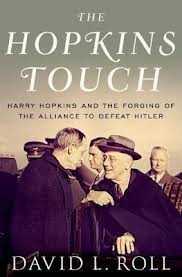Harry Hopkins is one of those historical figures that pops up in correspondence, photographs, history books and television shows about World  War II. He’s in the text, in the captions, but it is difficult to know exactly who he was or what he did. David L. Roll remedies this in an immensely readable book, The Hopkins Touch: Harry Hopkins and the Forging of the Alliance to Defeat Hitler. A big volume that is easily handled, The Hopkins Touch chronicles the life and influence of a Midwestern reformer who became one of President Roosevelt’s most trusted advisors.
War II. He’s in the text, in the captions, but it is difficult to know exactly who he was or what he did. David L. Roll remedies this in an immensely readable book, The Hopkins Touch: Harry Hopkins and the Forging of the Alliance to Defeat Hitler. A big volume that is easily handled, The Hopkins Touch chronicles the life and influence of a Midwestern reformer who became one of President Roosevelt’s most trusted advisors.
Hopkins was a progressive reformer who found a home in the New Deal. As he became known to President Roosevelt, the two men hit it off and became very close. Hopkins was discreet with a real sense of humor. He did not need the spotlight and he had an unerring gift for discerning the true matter at hand. Loyal, smart, and extremely effective, Harry Hopkins was an extension of FDR.
Hopkins was also a very ill man. Following intestinal troubles as a young adult he had much of his stomach removed, leading to a lifetime of complications and pain. A chronicle of Hopkins life is filled with trips to hospitals, consultations with physicians, collapses and near collapses. At death’s door for the last two decades of his life, Hopkins nevertheless was able to engage and persevere. His ability to focus and work through extremely stressful and demanding responsibilities while in great physical pain was acknowledged by all around him.
Roll’s work highlights Hopkins’ diplomatic skills. He made a great impression on Churchill, Stalin, and many of the other wartime leaders. His charm was certainly enhanced by his relationship with Roosevelt, but it also was quite effective on its own. In many ways Hopkins’ communication ability and smarts was critical in bringing the Allies together and helping them fight collaboratively. That was no small accomplishment. So even though Harry Hopkins lacked a formal title through much of World War II, he is well worth considering, remembering, and above all, thanking.
David Potash
